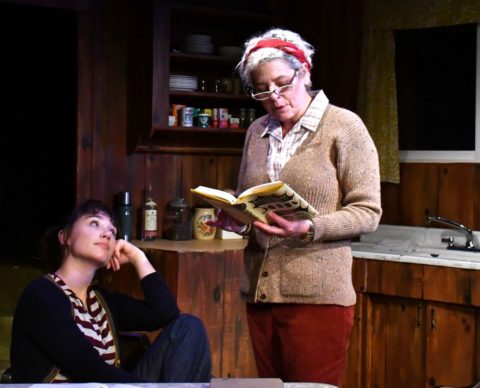
Zoë Foulks and Stacy Ross (Photo: Jay Yamada)
Oh, the things people say!
“I am lost in a hall of mirrors. It’s a maze in here, and no one ever gets out.”
“I miss him so much, my heart leaps out of my chest.”
“I dream I have a penis and I’m raping people with it.”
Not really though. You’d be hard-pressed to discover examples of such hackneyed, saccharine or wacko verbiage anywhere but a personal journal, a pulpy paperback or, alas, in “When We Were Young and Unafraid” the distractingly uneven feminist potboiler now on stage at Custom Made Theatre Co.
Every time one of these overripe gooseberries splattered out of playwright Sarah Treem’s dialogue, it caused me to cringe and disengage from what in other respects seems like an earnest attempt at social realism, circa 1972.
Set on Puget Sound’s Whidbey Island in a bed-and-breakfast that secretly serves as a safehouse for battered women, the story orbits around the stalwart, modestly heroic Agnes (Stacy Ross), who’s been running the operation for nearly two decades after losing her nursing license for performing abortions. Ross is superb: world-weary, dry-witted, wringing echoes of a lifetime from the pauses in her reticent speech.
But she’s lucky to play the only character never required to wax ridiculous by Treem’s script. In fact, the other four cast members are also rock solid, but the effectiveness of their performances is undermined by occasional declarations all but guaranteed to have audience members actively resisisting the urge to facepalm.
If the loud clunk of such lines (“Why should I have to absolve myself for having a vagina?!”; “Passivity is the minotaur.”) wasn’t already enough to disconnect the audience from Treem’s storytelling, the structure of her script (slightly abetted by Tracy Ward’s direction) provides an assist: With too-long blackouts between too-short scenes, the first act of “When We Were Young” repeatedly generates a small degree of tension, then breaks it rather than building on it.
The primary storyline concerns the relationship between Agnes, her newest shelter-seeker—battered military wife Mary Ann (Liz Frederick), and 16-year-old Penny (Zoë Foulks), her longtime charge, who has grown up here, witnessing the plight of the abused, but still harbors her own fairytale fantasies (She’s dating her high school’s football captain). An itinerant handywoman, Hannah (Renee Rogoff, funny and charismatic), drops in unexpectedly, primarily to offer a lesbian separatist take on things. And a sideburned, socially awkward B&B guest, Paul (Matt Hammons, a winning Prince Dork) provides an effortfully feminist male counterpoint to Mary Ann’s monstrous husband, never seen but ever-present.
All of the kitchen-sink drama takes place in the B&B’s kitchen (Designer Bernadette Flynn’s woody, worn-looking set is just right). Drama-wise, it’s dark, but lacking much arc. Treem,who wrote the tightly plotted first season of television’s “House of Cards” displays a much looser grip here. There’s a bit of ginned up conflict, but, particularly in its momentum-deficient second act, “When We Were Young” feels less like a well-built story than a so-so colloquium on conflicting perspectives in the era of Women’s Lib.
In the show’s final moments, only Agnes and Hannah remain. Hannah seems to have given up on the utopianism of the womyn-only commune where she’d been planning to live. And Agnes seems to realize that by isolating herself in her shelter all these years—an eye in a gender-war storm—she may have been indulging in an even more severe form of separatism. But this scene was less impactful than it might have been, because an earlier moment of Hannah’s was replaying itself in my mind: The one where she boasted that after she repaired a window it would be “sliding as easy as a horse’s twat.”
Enough said.
Originally published in the Bay Area Reporter
